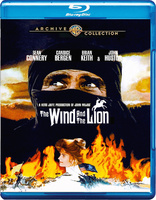The Wind and the Lion Blu-ray Movie
HomeThe Wind and the Lion Blu-ray Movie 
Warner Archive CollectionWarner Bros. | 1975 | 119 min | Rated PG | Apr 29, 2014
Movie rating
7.3 | / 10 |
Blu-ray rating
| Users | 4.2 | |
| Reviewer | 4.0 | |
| Overall | 4.1 |
Overview
The Wind and the Lion (1975)
At the beginning of the 20th century an American woman is abducted in Morocco by Berbers. The attempts to free her range from diplomatic pressure to military intervention.
Starring: Sean Connery, Candice Bergen, Brian Keith, John Huston, Geoffrey LewisDirector: John Milius
| Period | Uncertain |
| Drama | Uncertain |
| Adventure | Uncertain |
| Action | Uncertain |
Specifications
Video
Video codec: MPEG-4 AVC
Video resolution: 1080p
Aspect ratio: 2.35:1
Original aspect ratio: 2.39:1
Audio
English: DTS-HD Master Audio 5.1 (48kHz, 24-bit)
Subtitles
English SDH
Discs
50GB Blu-ray Disc
Single disc (1 BD)
Playback
Region free
Review
Rating summary
| Movie | 4.0 | |
| Video | 4.5 | |
| Audio | 4.0 | |
| Extras | 3.0 | |
| Overall | 4.0 |
The Wind and the Lion Blu-ray Movie Review
It Is Good to Have This Blu-ray
Reviewed by Michael Reuben May 8, 2014Among filmmakers who emerged from the creative cauldron of the 1970s, John Milius is one of the most intriguing but least remembered. Part of that, I suspect, is attributable to the very quality that makes Milius unique, which is his almost pathological addiction to conflict and contradiction. Like Sam Peckinpah, a director he admires, Milius' creativity seems to feed on opposition. As the old studio system was gradually replaced by the media conglomerates that began to take shape in the Eighties, Milius was ill-equipped to make the kind of compromises that have allowed contemporaries like Spielberg, Lucas, Scorsese and Coppola to continue making movies. A typical example of Milius' rhetoric can be found on the commentary track recorded in 2004 for The Wind and the Lion, where Milius contrasts his "imperialist side" with his "Marxist side". Having ensured that he's grabbed every listener's attention (and offended more than a few), Milius chuckles as if he didn't mean any of itóbut he probably does. Milius is best known for the original Conan the Barbarian (1982) with Arnold Schwarzenegger and the original Red Dawn (1984) with Patrick Swayze, but the film that best captures his unique temperament is the 1975 epic The Wind and the Lion (hereafter, "W&L"), which was originally an MGM production but is now owned by Warner. A reasonable success on its initial release in May 1975, the film was overshadowed by the first modern blockbuster, Jaws, which appeared the following month and was all anyone talked about for the rest of the summer. But W&L has proved as durable as Jaws in its own small way, because there's nothing else like it. While Milius' fellow rebels were looking for new ways to reframe the cinematic world, Milius deliberately tried to recreate the look of a David Lean epic. He even shot in some of the same locations used for Lean's Lawrence of Arabia. The subversive element was what Milius put into the frame, which was the very opposite of a David Lean story. W&L is so light-hearted in its treatment of serious matters, and Milius is so irreverent in his portrayal of even the characters he admires (notably President Theodore Roosevelt), that the film often verges on a Mel Brooks satire. My college friends were particularly fond of the following solemn exchange between Sean Connery's noble Berber commander, Raisuli, and the Sherif of Wazan, the Sultan's representative, as they set off on horseback:
Raisuli: Where is it exactly where we are going? Sherif: To a small village east of Rabat at the foot of the mountains. Raisuli: It is good. Sherif: What is good? Raisuli: It is good . . . to know where we are going.
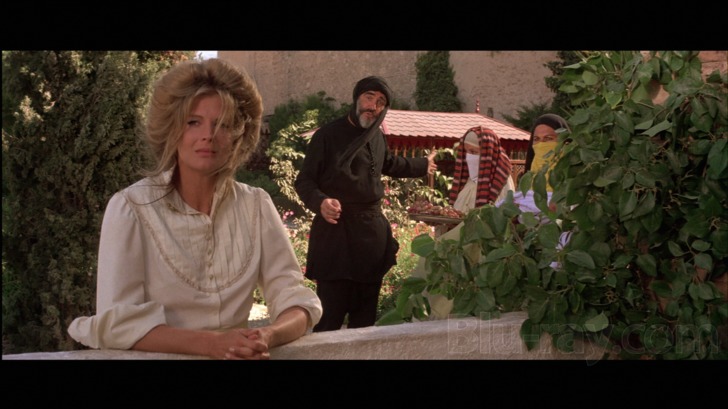
The time is 1904, ten years before squabbling among the great powers of Europe over their interests at home and abroad would lead to World War I. Morocco remains one of the few independent Arab states, nominally ruled by an immature Sultan (Marc Zuber) but in reality by his uncle, the Bashaw (Vladek Sheybal). The French, the Germans and the British are all vying for influence. Into this delicate situation rides Mulai Ahmed er Raisuli (Connery), the courtly Muslim leader of the Berber insurrection dedicated to unseating the Sultan and driving out the infidels. As the film opens, Raisuli kidnaps the widow of an American diplomat, Eden Pedecaris (Candice Bergen), and her two young children, William and Jennifer (Simon Harrison and Polly Gottesman), from their mansion in Tangier. Raisuli's immediate goal is to hold these captives for ransom, although this is only part of his larger plan. But Eden Pedecaris is no shrinking violet, and she has no intention of making life easy for Raisuli. In Raisuli's repeated and often comical line: "Mrs. Pedecaris, you're a lot of trouble." Across the Atlantic, President Theodore Roosevelt is running for re-election. Although career politicos like John Hay (John Huston) consider the former Rough Rider a cowboy buffoon, Brian Keith portrays Roosevelt as a visionary, confident of both his own greatness and that of America. When Roosevelt learns of the Pedecaris abduction, his reaction is swift and politically astute. He declares: "America wants Pedicaris alive, or Raisuli dead!" Crowds of supporters cheer, as Roosevelt makes campaign stops by train, in the fashion of the day. Without ever meeting, Raisuli and Roosevelt face off across a vast distance over the fate of Morocco. Although they are enemies, they have much in common, as Roosevelt explains in a revealing scene with his daughter. Both are convinced of their historic mission; both suffer the loneliness of leadership; and both have a distinctive vision for the future, except that Roosevelt sees a world dominated by America, while Raisuli sees a Morocco freed of outside forces. We know that it is Roosevelt's vision that will prevail, and Milius underlines the point by reconceiving history to have American troops invade Tangier and seize the Bashaw to force negotiations with Raizuli. But is this a critique of American foreign policy, in the immediate aftermath of Vietnam, or an endorsement? It's hard to say. The battle is staged with such gusto that you can't help but cheer for the Americans, and yet there's something unseemly in the way they march into an unprepared foreign town and shoot down an inferior force. Warned that the action is illegal, Roosevelt replies: "Why spoil the beauty of the thing with legality?" While these geopolitical events play out around them, the relationship between Raizuli and Eden Pedecaris is changing from that of kidnapper and victim to something else. I wouldn't call it a "romance", although the term has frequently been used. Their worlds are too different for any such connection (and Raizuli already has several wives). Still, Mrs. Pedecaris begins to recognize in Raizuli a man of principle with a code of honor and a legitimate cause, and Raizuli grows to respect this "troubling" woman for her courage and her refusal to submit to captivity. The closest they come to a "romantic" gesture is to rescue each other from various perils, but their bond is more than friendship. Milius takes full advantage of his scenic locations (with Spain substituting for Morocco) and stages several big set pieces, including the initial abduction, the military takeover of Tangier and a climactic assault on horseback against a heavily fortified German encampment. Meanwhile, W&L keeps cutting back to Roosevelt, with his musings on the American "character" and its similarity to that of the grizzly bear, which should always be depicted standing upright and ready for battle. Is the film an endorsement, a parody or a critique? Maybe it's all three, but like its heroine, the film is a lot of troubleóin the best possible way.
The Wind and the Lion Blu-ray Movie, Video Quality 
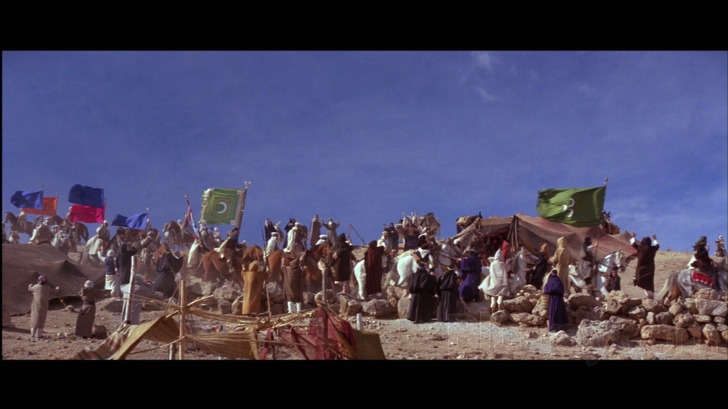
Milius picked Oscar-winning cinematographer Billy Williams (Gandhi ) to shoot The Wind and the Lion, because he admired Williams' work for Ken Russell on Women in Love. Throughout his commentary, Milius repeatedly praises Williams' ability to capture the beauty of the locations and the natural production value of the sky's changing colors. Warner Archive Collection's 1080p, AVC-encoded Blu-ray continues WAC's string of solid releases with a sharp and detailed image featuring vividly saturated color, solid blacks (essential for various night scenes and Raisuli's signature dark attire), good contrast levels and a gorgeous sense of depth from the framing of sky, mountains and the golden sands of the desert. Grain is finely rendered, and video noise is entirely absent. The quality of the transfer can be readily observed in the tiny details of rock formations, sand, Connery's weatherbeaten face and the many long shots of large groups of soldiers or Berber warriors in which each figure remains distinct. As has been their practice, WAC has not aimed for the tight compression favored by their parent company but has used the available space on a BD-50 to achieve a generous average bitrate of 34.87 Mbps. No compression errors appeared, and the parent company might want to consider whether the continued high quality of WAC's releases may have something to do with its willingness to use all of the digital real estate that a Blu-ray disc provides.
The Wind and the Lion Blu-ray Movie, Audio Quality 
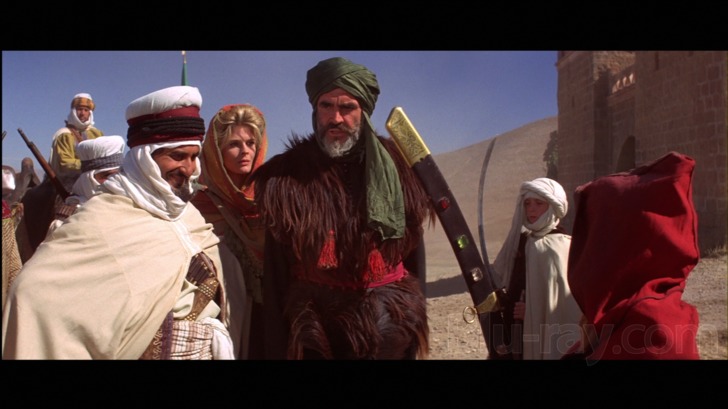
W&L was released in mono, but it also received a 70mm release with a six-track mix that was presumably the basis for the 5.1 soundtrack presented on the 2004 DVD in Dolby Digital and on Blu-ray in lossless DTS-HD MA. Like many such mixes created for mono films, the orientation remains forward, but the separations across the front soundstage are noticeable, especially in major action scenes and in the spacious rendering of Jerry Goldsmith's majestic score. Dynamic range is remarkably good for a film of the period, especially at the low end, which helps drive home the impact of the copious gunfire and explosions (some of which used real dynamite, according to Milius' commentary). The dialogue is generally clear, except for an occasional phrase from Connery, where the combination of a Scottish brogue and Arabic expressions can be challenging. (Milius has suggested, perhaps facetiously, that we assume Connery's character was taught English by a Scotsman.)
The Wind and the Lion Blu-ray Movie, Special Features and Extras 
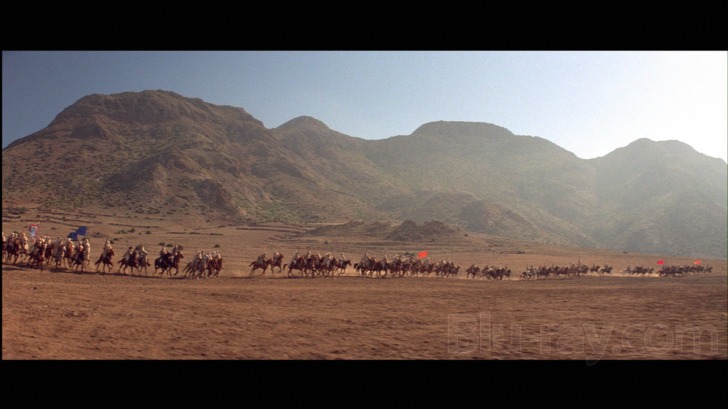
The extras have been ported over from Warner's 2004 DVD.
- Commentary with Writer/Director John Milius: Recording this commentary nearly thirty years after making the film, Milius has a remarkable memory for locations, stunts and logistics. Time has mellowed some of the complaints he freely (and perhaps foolishly) made about his two stars at the time of the film's release, and now he has only positive things to say about their performances. One point he makes repeatedly is how much money was saved by finding and using existing locations rather than building sets. Despite many provocative remarks, such as the one quoted in the introduction, anyone looking for an overview of the film's themes or point of view will be disappointed. On that subject, Milius remains elusive.
- Behind the Scenes (480i; 1.33:1; 9:41): This is an older style of EPK that eschews the hard-sell that is common today and simply edits together interesting moments on location with a few short interview clips from the stars of the film and the director.
- Trailer (480i; 2.35:1; 3:34): The most notable aspect of the film's trailer is the lack of narration or intertitles. Today, it's hard to imagine a PR campaign that would let scenes from the movie speak for themselves for three and a half minutes.
The Wind and the Lion Blu-ray Movie, Overall Score and Recommendation 
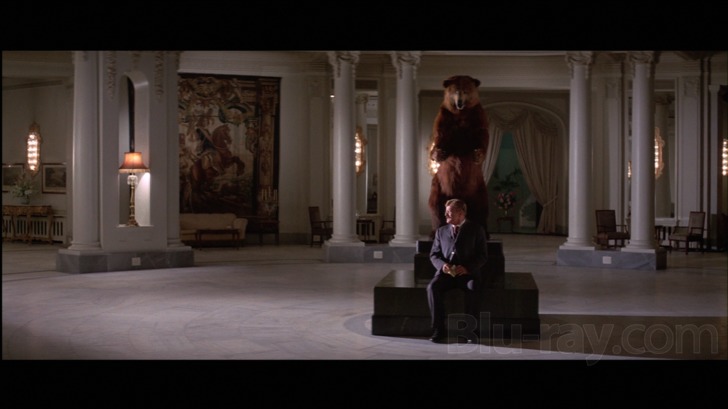
The Wind and the Lion is unique, original, often perplexing, sometimes maddening, but always entertaining. What you see in it will depend a lot on what you bring to it, especially after the many twists and turns in the rocky relationship between the United States and the manifold elements of the Middle East in the years since the film's release. But whatever your reaction, you certainly won't be bored. Highly recommended.
Similar titles
Similar titles you might also like

The Eagle Has Landed
1976

Aces: Iron Eagle III
1992

The Green Berets
1968

Ice Station Zebra
1968

Beirut
2018

Khartoum
1966

Against All Flags
1952

Where Eagles Dare
1968

The Man Who Would Be King
Warner Archive Collection
1975

The Blue Max
Limited Edition to 3000 - SOLD OUT
1966

The Wild Geese
1978

Merrill's Marauders
Warner Archive Collection
1962

Flying Tigers
1942

The Red Ball Express
1952

Too Late the Hero
1970

Kingdom of Heaven 4K
Director's Cut
2005

Pork Chop Hill
1959

The Dirty Dozen
1967

The Passage
1979

The Sea Hawk
Warner Archive Collection
1940
